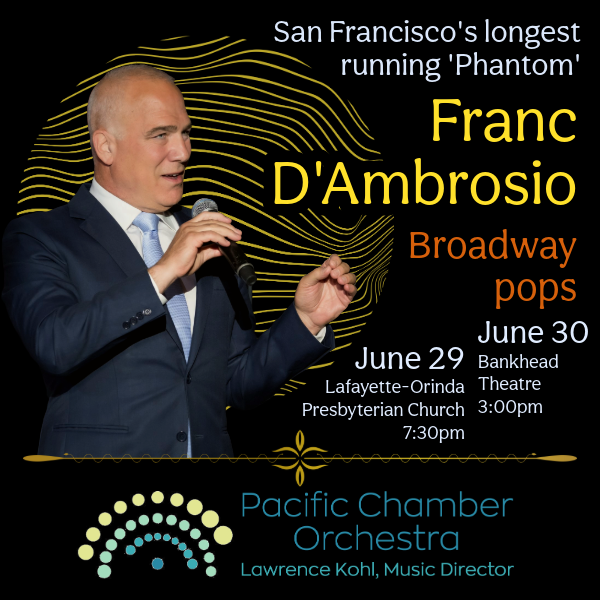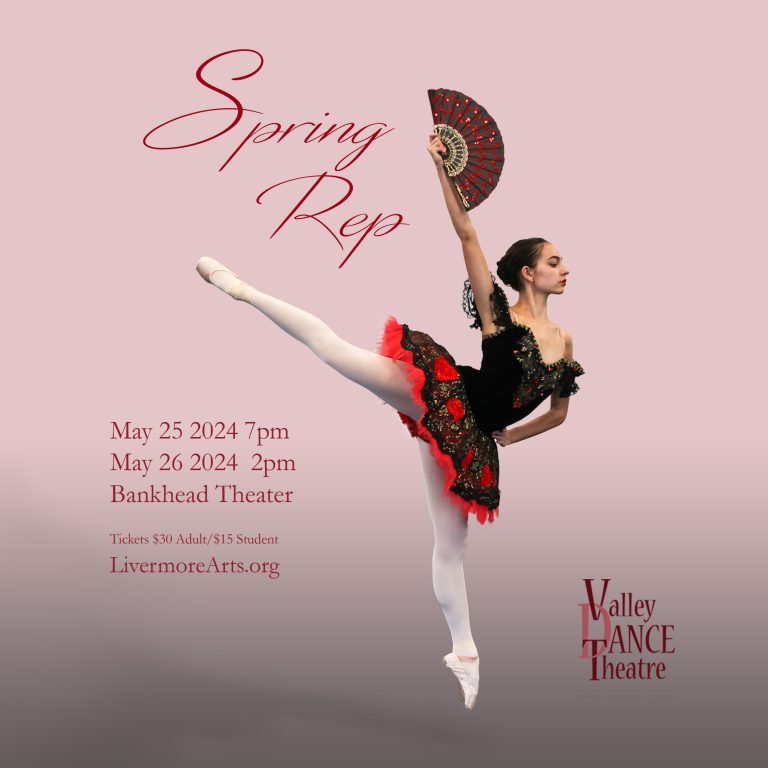CARTER: Hello everybody, my name is Chris Carter, I’m the Executive Director of Livermore Valley Performing Arts Center and I’m here today with Supervisor Scott Haggerty, who was integral in the formation of the space that we’re in right now, the Bankhead Theater. Scott has decided not to have another term here, he’s moving on but before he leaves we wanted to get a chance to talk to him and say thank you so much for everything he’s done for us and for the arts. We’re so glad to have you here today, Scott.
My first question for you is, thinking about the arts in your own life and what it’s meant to you growing up and the impact it’s had on you and why it’s been important to you for your whole life.
HAGGERTY: You just hit a couple of memories real quick that I wasn’t even planning to talk about. But I remember as a young boy going to Mattos Elementary over in Fremont. I was Young Scrooge in the play Scrooge for the school. The only reason I remember that so much is the newspaper did a big article about it and my picture was there! That was my foray into the arts. But over the years, I can’t say that I’ve been that involved in plays or anything like that. I played a little bit of a musical instrument but that has since gone. I will say this, I do hope to learn the saxophone going forward!
I don’t know if I’m kinda getting ahead of the ball, but my father ran for City Council in 1974 in the City of Fremont. Although he lost — it was pretty tragic thing for the family – you work so hard and you don’t get something. But one of his main platforms was he wanted to build a performing arts center and he wanted to build it in Fremont. It’s kind of funny, as I look back at some of those articles, there were actually people criticizing him for wanting to do that. I never understood why. You look around this venue, you walk around it you see the people on the back wall, the people that have touched this stage, their names, the posters. There’s a lot of enjoyment that comes out of this building, and it probably reduces a lot of people’s stress level on a Friday or Saturday night.
“There’s a lot of enjoyment that comes out of this building …
it probably reduces a lot of people’s stress level on a Friday or Saturday night.”
I can’t tell you when I ran for County Supervisor that one of my main accomplishments would be getting a performing arts center built. But I can tell you it’s probably one of my prouder ones, to be honest with you. And that just comes from surrounding yourself with good people. Good people knocked on my door and asked me to work on this.
CARTER: So let’s talk about this then. The story I hear all the time is that the Bankhead Theater would not be here if it wasn’t for Scott Haggerty. So in your own words can you walk us through what happened and how we got here.
HAGGERTY: So when I was running for office, at the time, a very large issue was the County had approved this huge mega dump out in the Altamont. And it was huge, there would have been dump trucks all day running up and down 580 cutting through Livermore. And when I got elected I decided that’s not what I wanted for Livermore, even if it was in unincorporated area, so we started fighting the landfill. In fact, my predecessor Supervisor Ed Campbell, he didn’t get mad at me about a lot of things, but I think he was kind of mad at me about that one. But we sat down out of court and we started negotiating a settlement and one of the things we negotiated was a community impact fee and prior to that I had met with a few people. We’re talking 23 years ago and, maybe for a lot of people that’s not that long ago, but for me it’s hard to remember yesterday! But I do remember Phil Dean was there and I do remember Joan Seppala was there. John Shirley might have been there, not sure. We met at the Doubletree out in Livermore. I don’t even think it was called the Doubletree at the time. And they talked to me about this grand idea they had, that they wanted to build this performing arts center in Livermore. And I thought, that’s really cool. I want to be a part of that.
But when you talk about building something as grand as a performing arts center – as you told me earlier it’s six stories and one story down – it’s a lot of money, so you try to figure out how you can cobble this together. Well, as we were going through the waste management lawsuit, I was talking to some of the council members in Livermore. And I was saying you should really get a host community impact fee. I’m really happy that my colleagues weren’t watching at the time because they probably would have said that money should really go to the County of Alameda, not the City of Livermore. But I thoroughly believed that the City of Livermore was going to be impacted by the landfill. So we were able to put a fee that actually was money that would go to the City of Livermore for community benefit projects. And it rolled around that this was the project. This was the project the community wanted to do. If it wasn’t for Joan Seppala, I’m not quite sure this project would be here – there was a lot of pushing and a lot of arm twisting, but when it got down to the end, the Livermore City Council graciously accepted the money coming in and continued to put money towards the Bankhead Theater. So that’s kind of a long-winded story about how it happened but who knew? But I guess this is “One man’s garbage is another man’s treasure.” So here you are, you’re sitting in it, here’s a community treasure off some garbage! (laughter)
“One man’s garbage is another man’s treasure.” So here you are…
here’s a community treasure off some garbage!
CARTER: I love that story. So let’s fast forward a few years. Because then some of the funding was to come through the redevelopment agency. Then, that money went away and the Bankhead was in a little bit of trouble, and you came in again and was instrumental and making sure it was saved.
HAGGERTY: I did, you know, back when that was going on. That was a shame, the whole redevelopment. Now you’re getting into the politics side of it. I’ll try to temper it a little bit. But Jerry Brown was then the Governor and prior to that was the mayor of Oakland and the City of Oakland was quite honestly wasting their redevelopment money. They weren’t doing things like building community assets, like building libraries, affordable housing, and things like that. They were using it to fund cops and all kinds of other different things. So Jerry Brown got a very skewed idea of what other communities were doing with redevelopment. But in fact, the county, we were building libraries in Castro Valley, we were doing really good things with the redevelopment money, building affordable housing and all that. And many cities were, including Livermore, but when he became the Governor, he wanted to get rid of it. I think to this day the state legislature, the assembly and the senate, both regret that decision. I don’t think it was good for the communities. We got extremely far behind on affordable housing. But a casualty of that was the Bankhead and I again had to go to my board and ask them to put some money towards this project, which we happily did.
I think in government when you can do something like build the Bankhead that’s really something to celebrate. It’s really not something you run from. It’s providing for the community and that’s what I’ve always viewed as my job. There some pretty unpopular things I have to do but any time you can do something like this, I think it’s a good day. You walk out of the building a little taller with your chest out a little bit further, so we were happy to do it. I know that there were times when people wanted me to go back to my board to do it and the last time I went back to them, they were losing their appetite, I could kind of feel it. Because they didn’t understand why I was expending County money in a city, but this was so very important to keep.
“…any time you can do something like this, I think it’s a good day.”
CARTER: I’m glad you did that.
HAGGERTY: I am too! No regrets here. None at all. I think this has been a synergy for the whole downtown. It’s done what was promised. And when you think back to when I first got elected and you look at downtown Livermore and what the Bankhead did and then some great decisions by the city councils. And I say councils, there were a lot of councils. There were a lot of champions even for this project. You know, I told my staff today, there’s no “I” in team. There were a lot of people who did this and I know I get a credit for raising a lot of the money, but that’s it. There are a lot of people. This is the culmination of a lot of people’s dreams. I don’t take it alone but I can tell you that this is probably one my proudest endeavors. I will tell you that I think this has created great synergy for downtown Livermore, for its restaurants, for entertainment outside, and just everything that it’s done for the community. It’s a walkable beautiful community that’s a lot of fun to be in.
CARTER: Thank you. I can tell you I started here in 2014 when a lot of that was going on and this has been a dream for me too. I love being a part of this and I think it’s a great space to be in and I feel so blessed to be able to work and be a part of this environment.
And we’re a non-profit organization that operates this space. Can you talk a bit about why it’s important to support the arts. This is a great space, but we still need to raise money every year. We have great, wonderful donors and supporters. In your mind, why is that important, to support the arts?
HAGGERTY: Because nobody else will. Now when I say nobody else, I’m not referring to your donors. I’m referring to government. They don’t have huge appetites for this. And maybe because there’s just so many pressing issues. When I look at that and say nobody else will, then I look at all the fine donors you have, that donate anywhere from money to equipment, those people are the heart of the community. Those are the people who get it. When you look at why you should support this. You never know when you’re going to wind up in this seat, you never know when you’re going to wind up in this seat, looking up here and watching your child or your grandchild performing in a play or play the flute or the trumpet or the drums or whether you’re going to get the ability to come see some show you’ve been dying to see in a very imitate setting. This is why you support the arts. It allows you to recreate your mind.
“This is why you support the arts. It allows you to recreate your mind.”
And I think that the more people touch the Bankhead, the more people want to become a part of the Bankhead and it’s so very easy to do. People need to understand, and these are tough times right now, but people need to understand that even if you dig in your pocket and pull a $10 bill out, that’s one step closer to saving this facility. And so I think that’s why it’s important. Could you imagine if we didn’t have venues like this to go to? I think we’re all imagining that right now because we don’t have these venues to go to and we’re getting restless, but we’re humans we need to be out and we need to be amongst each other. We need to be at a show, going out at intermission and seeing a friend you haven’t seen in 10 years, which has happened to me. The times I’ve been at the Bankhead I always run into somebody I haven’t seen in maybe 5-10 years. This is the heart of the community. This is where it beats. You have to continue to invest in your heart, because if you don’t have it, you lose as a community.
CARTER: We’re part of a coalition of venues right now in Alameda County and we’ve never really talked or worked together at all. Some of them are non-profit, and for profit, but they’re all in some kind of jeopardy right now because of what’s going on. Do you have any advice for the operators or is there anything you want to let them know?
HAGGERTY: You know I don’t look to the floor because I don’t have an answer. Maybe I don’t. I do know Alameda County just released arts grants, I don’t know if it’s gone public who got money. I can tell you this, everyone in Livermore who asked for money, got money. And they knew I was going to ask, to be very honest with you. Look, I got a phone call from my daughter today, she got her vaccine. The vaccine is coming. We’re going to need these spaces, we will need the small operators and the large operators. I guess the first thing I say is “Hang on.” They understand that, that’s almost patronizing because they are. Any way the county can help, we’ll try like with the arts grants.
I think again, when it comes to the arts, it’s really hard to rely on government. So when I talk about this being the heart of the community. The community needs to help and those of you that are running these facilities need to get out in the community – I know you are, Chris – and let them know we’re in jeopardy. If we can hold on a few months … if we can just hold on a few months. Earlier we were talking about your burn rate every month. These are big dollars, but this has to matter. The arts has to matter. So I don’t know if I can offer a lot other than to say that I don’t know of many other counties that gave arts grants, I don’t know that. We’re trying as a county, but just hold on. We’re almost there.
“These are big dollars, but this has to matter. The arts HAS to matter.”
CARTER: Thank you, we did apply for that.
HAGGERTY: Pretty sure I saw you on the list. I can look at my email later (laughter)
CARTER: I can’t want to find out! I’ve got one last thing for you. Phil Wente. I emailed him I wanted him to show up today but he couldn’t make it. So I asked him if there was anything he wanted to say to Scott and he wrote me a note saying, “Scott was a staunch, unwavering, tenacious supporter of LVPAC and the Bankhead Theater from the very beginning, not only embracing the concept, but creatively suggesting ways to tailor the vision that would allow it to become reality. He remained confident even with the loss of the redevelopment agency, that LVPAC could achieve a sustainable future. His leadership and determination was a huge boost for the morale of the community and the success of the Bankhead. Thank you, Scott.” And then Ed Willig who was the attorney who helped work on a lot of this …
HAGGERTY: Wasn’t he involved in the burning of the mortgage? That was a fun event. I wish I could burn a mortgage once in a while (laughter.)
CARTER: Don’t we all! And he just said “I don’t think the Bankhead would exist without Scott. Long before I began representing LVPAC, Scott and Joan worked together so that a portion of the host community impact fee would from the landfill at Altamont and Vasco Road would be directed towards Livermore and dedicated to the performing arts. The long-term steady stream of revenue from the landfill was the basis for the financing of the Bankhead Theater and it could not have been financed without those revenues.” He continued on to how you came later on, in 2014, and saved the day for us again.
So just thinking about what they said, those stories and your own legacy here. We have on average about 60,000 people come through those doors every year, so over 12 years that’s over a half million who have been able to come here and experience the arts in an intimate way. How does that make you feel that that’s your legacy, that this is going to be here, hopefully forever, and continue to do that for this community.
“Over 12 years that’s over a half million [people] who have been able to come here
and experience the arts in an intimate way.”
HAGGERTY: First of all, thank you to Phil and Ed. I’m one of those guys that walks out the door a little taller with my chest out a little bit further. Again, I certainly didn’t do this alone. I helped find the money. But I guess if you’re going to have political legacy the fact that you worked with a city and helped build a performing arts center that satisfies the inner being of a half million people each year. Damn, I’ll take that, I’ll take that every day, so it makes me feel really good. And I know that we had grander hopes down the road but redevelopment killed those, but yeah, I’ll take this as a legacy!
CARTER: Thank you. Thank you for what you’ve done. I know lot of people would probably fill the house with everybody that would want to say thank you for make this space happen. I know personally I’ve gotten a lot of enjoyment. The arts bring people together, they enlighten us, they do so much. Thank you, I wish you well as you move on into this next stage of your new life. I hope you stay in touch and when you come back in town, you come see a show.
HAGGERTY: I will. I’ll be happy to come see a show. I’ll be happy to stand on the stage and wave at everybody too. You just let me know. But we’ll get you open soon.
CARTER: It’s a deal! Thank you, Scott.







